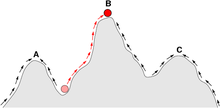An argument from poor design. | © Credits: Wikipedia.
Materialists and atheists are trying to bombard the advancement of theistic intelligent design hypothesis as part of scientific creationism. Meanwhile, there are non-theistic groups who claim that the universe was not intelligently designed and is “purposeless”. Just like the famous agnostic biologist Richard Dawkins stated in his book The River Out of Eden: A Darwinian View of Life, “The universe that we observe has precisely the properties we should expect if there is, at bottom, no design, no purpose, no evil, no good, nothing but pitiless indifference.“
Dawkins’ pessimistic mind never shows his regret to what he claims. Dawkins obviously believes that life is just a product of mindless and purposeless chances. No divine intervention behind it all. But is he correct to all his views?
The concept of dysteleology
People who believe that the universe was not directly designed nor has a purpose are called dysteleologist. They are trying to point out the concept of what they called dysteleology. But what does it mean to say?
We will look up its finest definition here.
According to the Modern Catholic Dictionary, dysteleology refers to the “lack of purpose or design, either as a result of thoughtless action on someone’s part or as a theory of despair that sees no providence in the world but only confusion and disorder. (Etym. Greek dys, apart + telos, end, completion + logia, science, knowledge.)”
Wikipedia says that dysteleology, “also known as the argument from poor design, is the philosophical view that existence has no telos – no final cause from purposeful design. Ernst Haeckel invented and popularized the term dysteleology.”
There it goes. Most atheists and agnostics assume that the whole universe has no purpose, no design, no meaning, and significance. This will lead them to believe that there is no Designer or Maker of the universe. Why do they think such ideas? What is the evidence to support their claim that the world was poorly designed?
The world was poorly designed — isn’t it?
In the last section of his interview with Stephen Meyer, Christian apologist Lee Strobel brings up the dysteleological argument, asking how intelligent design can account for the faults and imperfections in the natural world that would seem to cast doubt on the wisdom or benevolence of the designer. He begins with a classic argument, the inverted retina. Quoting the biologist Kenneth Miller:
“We would have to wonder why an intelligent designer placed the neural wiring of the retina on the side facing the incoming light… This arrangement… produces a blind spot at the point where the wiring is pulled through the light-sensitive retina to produce the optic nerve that carries visual images to the brain.” [p.86]
— The Case for a Creator by. Lee Strobel
In this case, one may think that the designer is not intelligent. But this is not what we will expect.
The problem of dysteleology
Stephen Meyer waves this off, claiming (without further explanation) that this arrangement is “a tradeoff that allows the eye to process the vast amount of oxygen it needs in vertebrates” [p.87], which Strobel accepts without qualms. He admits that this arrangement produces a blind spot, but “that’s not a problem because people have two eyes and the two blind spots don’t overlap.“
Meyer tries to ward off the dysteleology argument by claiming that all design has “inevitable tradeoffs and compromises.” It sounds like a lot of sense.
Teleological argument — strongest proof of the Grand Designer
The Teleological Argument or proof for the existence of a deity is sometimes called the Design argument.
It is the second traditional “a posteriori” argument for the existence of God. Perhaps the most famous variant of this argument is William Paley’s “watch” argument. This argument says that after seeing a watch, with all its intricate parts, which work together in a precise fashion to keep time, one must deduce that this piece of machinery has a creator since it is far too complex to have simply come into being by some other means, such as evolution. The skeleton of the argument is as follows:
Premises:
1. Human artifacts are products of intelligent design; they have a purpose.
2. The universe resembles these human artifacts.
3. Therefore: It is probable that the universe is a product of intelligent design, and has a purpose.
4. However, the universe is vastly more complex and gigantic than a human artifact is.
Therefore, there is probably a powerful and vastly intelligent designer who created the universe.
“For what can be known about God is plain to them, because God has shown it to them. Ever since the creation of the world his invisible nature, namely, his eternal power and diety, has been clearly percieved in the things that have been made. So they are without excuse.” — Romans1:19-20, ESV
Latest Posts
- Presidential Debate Highlights: Donald Trump vs. Joe Biden |
- China dams release water, submerging more cities and flooding more streets |
- Terror attack in Dagestan, Russia kills police, priest and destroyed churches and synagogues |
- Why is Jesus an “Archangel”, not God Almighty himself? |
- Terrorist weapon supplier killed in Lebanon strike, Israel reports |


no evidence at all for your “designer”. If you do wish to claim that some god designed the universe and everything in it, then I do expect you to explain why your god is evidently so malicious or stupid to make our sun give animals, including humans, cancer, and why this god is evidently so malicious or stupid to put the trachea beside the esophagus, guaranteeing that thousands of humans choke to death every year.
Romans 1 is no more than what any cult claims for their supposed creator god. You have no more evidence that your god is the right one than any of those other cults do.
Happily, humans give ourselves and each other purpose, no god needed.
“Meyer tries to ward off the dysteleology argument by claiming that all design has “inevitable tradeoffs and compromises.” It sounds like a lot of sense.”
nothing more than “best possible world” apologetic excuse.
LikeLike